Online theology degrees may interest you and help you achieve your goals if you have a calling to ministry or desire a deeper understanding of religious philosophy.
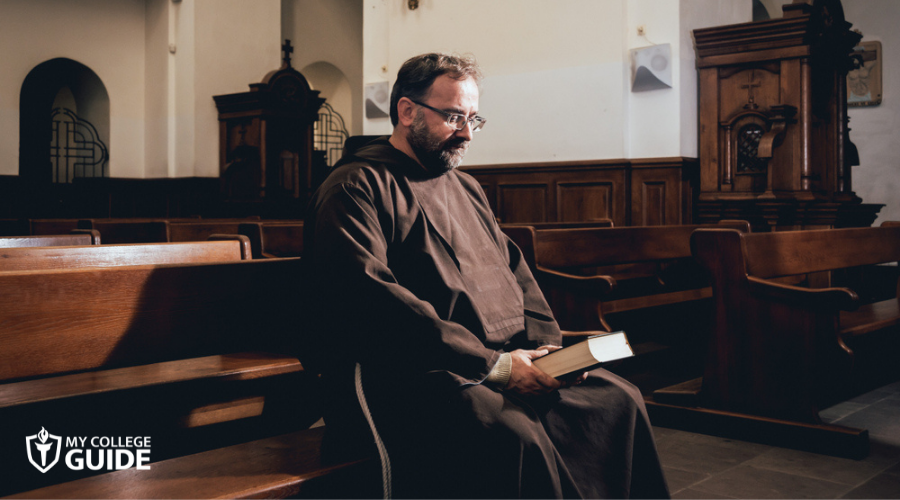
Through reputable online universities, you can pursue a variety of spiritual and biblical degree programs that teach the vital skills and knowledge needed to pursue a career in the diverse field of theology. Whether you are interested in evangelism, religious leadership, or biblical studies, there are a variety of degrees online available that can be tailored to suit your specific needs.
Editorial Listing ShortCode:
Theology is a broad field of study that can help prepare you for a number of careers, including religious teaching, writing, fundraising, and ministry.
Online Bachelor’s in Theology Degree
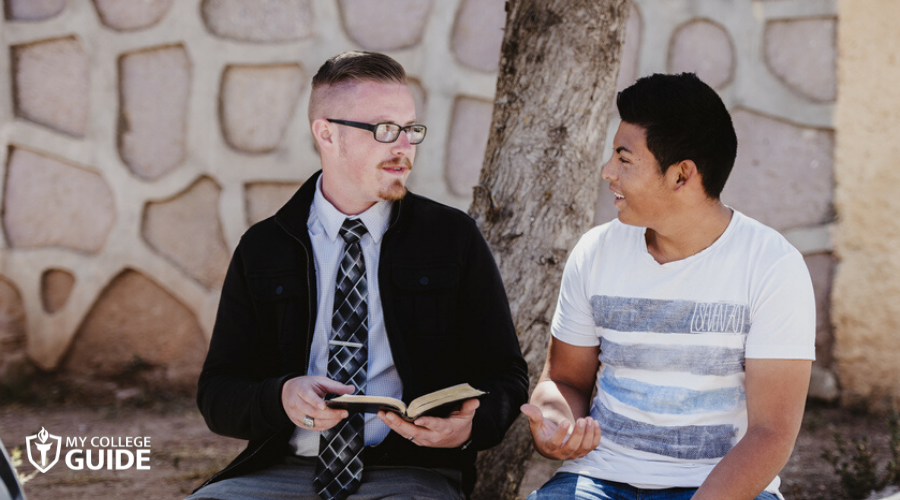
There are several top universities and online seminary schools that offer a variety of bachelor in theology degrees online that may be matched to your specific long-term goals and interests.
Editorial Listing ShortCode:
Within these online degrees in theology, you may also be able to choose a minor or specialization that allows you to further increase your skills and knowledge within a specific area of interest. Both Christian leadership and religion are popular theology degree programs that have the option to be completed entirely online.
Within a religion degree program, there are many areas of concentration that are offered to online students to enhance their curriculum. Some common concentrations offered are:
- Biblical and Theological Studies
- Christian Counseling
- Christian Ministries
- Evangelism
Along with your religious studies, a bachelors in theology online degree program can help you develop strong management skills. These along with your religious knowledge can allow you to pursue careers in the church as well as in non-profit organizations. After graduating, you may also pursue advanced studies in theology or divinity at a master’s or doctorate level.
Common Online Theology Degree Concentrations
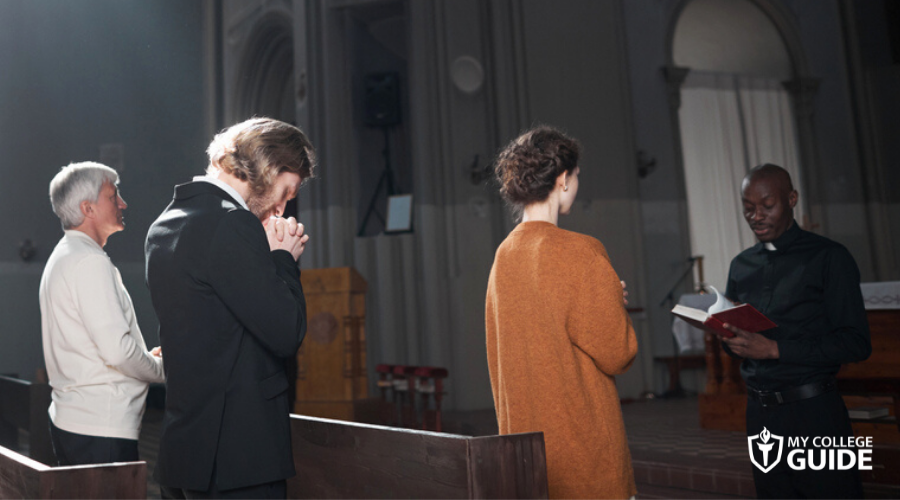
Theology is a broad term that encompasses many sub-disciplines which fall under the study of religion. Schools often offer concentrations in theology that allow students to specialize even further. Some common concentrations include:
- Religious Studies: Religious studies is the comparative study of religion, which explores religious traditions and how religion plays a role in society in various contexts.
- Divinity: This is the study of divine beings or God and all things considered sacred. This concentration can help prepare you for ministry positions.
- Ministry: Ministry includes the study of religion and the Bible. This concentration can help prepare you for ministry responsibilities, such as leading religious services and teaching others about Christian beliefs.
- Christian Education: This concentration incorporates theology with leadership and education courses. It can help prepare you for a career as a religious educator.
- Pastoral Ministry: Pastoral ministry is a more concentrated specialization in ministry studies, which includes the study of pastoral counseling, pastoral leadership, and biblical hermeneutics.
Concentrations can be supplemental to degrees and allow you to have a more personalized learning experience. If you have a specific career in mind or want to focus on a specific topic in theology, choosing a concentration may be useful.
Theology Careers and Salaries
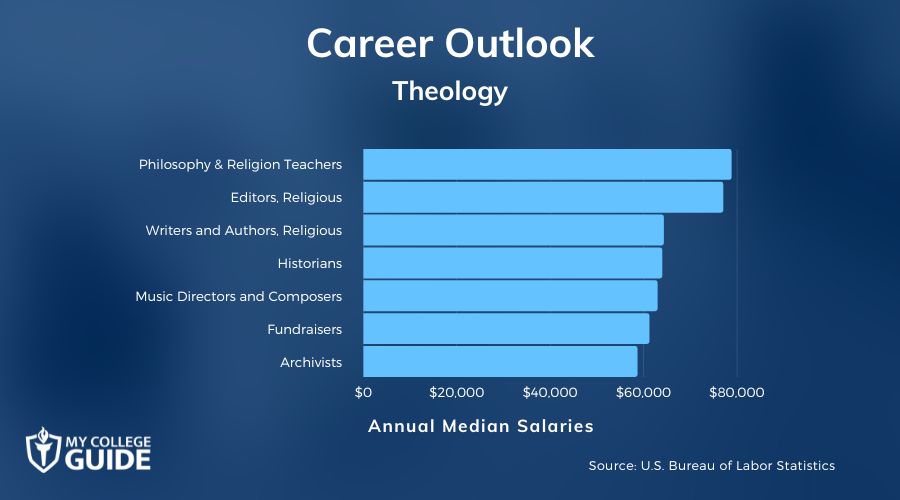
Religion and spirituality are core aspects of our society, and many people look to spiritual guidance on a daily basis in order to navigate the challenges of life. Due to this need for skilled religious leaders, the career outlook for those interested in theology is favorable.
According to the BLS, religious workers are projected to have a positive growth rate over the next 10 years. Additionally, these occupations have a median annual wage of $39,370. While this is lower than the national average across all occupations, this is still a solid salary for what many consider a personally fulfilling career path.
If your goal after earning a graduate degree in theology is to teach at a reputable college or university, there is a positive career outlook for your future as well. Postsecondary philosophy and religion teachers are projected to experience a 9% growth rate within their profession over the next 10 years.
Church and teaching positions are not the only careers that may be pursued with this degree. You may use the knowledge you gain in writing and journalist careers or pursue a position in Christian or pastoral counseling. You may also work for nonprofits or community outreach programs. If you lean toward the arts, you may combine your study of theology with music and pursue music ministry.
Your study of theology can be combined with a number of other studies to pursue careers in a variety of fields, including leadership, history, education, counseling, and more.
In the table below we have provided examples of some possible occupations that those with theology degrees may pursue, as well as their median annual salaries according to the U.S. Bureau of Labor Statistics (BLS):
| Careers | Annual Median Salaries |
| Philosophy and Religion Teachers, Postsecondary | $78,780 |
| Fundraisers | $61,190 |
| Clergy | $55,550 |
| Directors, Religious Activities and Education | $49,380 |
| Music Directors and Composers | $62,940 |
| Archivists | $58,640 |
| Editors, Religious | $77,000 |
| Writers and Authors, Religious | $64,280 |
| Historians | $63,940 |
| Counselors | $43,390 |
These are just some of the careers you may pursue with a degree in theology. Many of these careers may require a minimum of a bachelor’s degree, and some may require advanced degrees, supplemental education, or other work experience as well.
Editorial Listing ShortCode:
Your specific pay will be based on a number of factors, including your employer, location, education, and work experience.
For more information, you may view our list of the top 40 theology careers to further compare jobs and salaries in this field.
Bachelor of Theology Curriculum & Courses

Theological degrees online typically introduce students to several key topics relating to the study of religion. Some of these may be interpreting the Word of God, the history of Christianity, theological research methods, and ministry roles and responsibilities.
These are some common theology courses that may be offered in a theology program and what they typically entail:
- Introduction to Christian Theology: This course explores the fundamentals of theology concerning the Christian faith, including the evolution of Christian beliefs and traditions.
- Research in Theology: This course examines research methods used in theology, typically with a specific topic in theology assigned to focus your research on.
- Old Testament: In this class, texts of the Old Testament, or Hebrew Bible, are studied in various contexts and perspectives.
- New Testament: This course provides the opportunity to study scriptures in the New Testament and focus on how to interpret the Bible and identify key biblical figures.
- Methods in Religious Studies: This course teaches different approaches to studying religion in various contexts.
- Early Church History: Through primary and secondary sources, key historical events leading to the formation and evolution of the Christian church are studied in this class.
- Christian Ministry: In preparation for clergy positions, the practice of ministry, including its roles and responsibilities, is explored in this class.
- Introduction to Biblical Languages: This class is an introduction to the various languages of the Bible, including Hebrew and Greek.
- Homiletics: This class can help you learn how to interpret the Bible and write and deliver sermons.
- Practical Theology: Theological topics are applied in this course to help you gain an understanding of different religious practices from various perspectives, including ministry and pastoral care.
Your program may also include coursework that focuses on a specific religion, while other courses examine all religions and how different religious beliefs and practices may affect societies.
How to Choose an Online Theological Studies Degree Program

In general, theology degrees are offered by Christian or other religious colleges and universities to teach students specific spiritual knowledge and skills.
Over the years, these top religious universities have joined the trend toward online education in order to best meet the needs of adult students who are balancing work and family obligations.
In order to choose a theology program that best suits your needs, it is important to look at several factors beyond the curriculum of your specific degree program.
These are some common factors that can be helpful to consider when choosing the best school for you:
- Accreditation: Choosing a school with regional accreditation helps to ensure that you’ll receive a quality education that will be recognized by employers and other institutions. It is also necessary for many forms of financial aid. You may also wish to look into specific program accreditation.
- Student-to-faculty ratio: Theology programs typically require in-depth research and analysis of religious, philosophical, and historical texts. Smaller class sizes can help you acquire individual support from your professor to help you succeed in your studies.
- Academic advising and student services: Some services you may want to look for include, digital libraries, academic and career advising, tutoring, and internship placement.
- Travel requirements: While you may be able to complete your program completely online, some programs may require on-campus residencies or internships.
- Scheduling: You may choose between full-time or part-time classes. Some programs also offer accelerated programs so you can finish your degree faster.
These are just some factors you may want to consider when choosing the best school for you.
Admissions Requirements

Admissions requirements can differ between online theology programs, but these are some general requirements:
- High school diploma or GED
- Minimum GPA (only some schools require it)
- SAT or ACT scores (only some schools require them)
Some institutions may consider your GPA when determining admissions eligibility. If applicable, GPA requirements can vary, but a 2.5 GPA or higher is generally the minimum requirement. SAT or ACT scores may be required or optional depending on the school. If SAT or ACT scores are required, they may be for placement purposes or to determine admissions eligibility.
Online Theology Degrees Accreditation
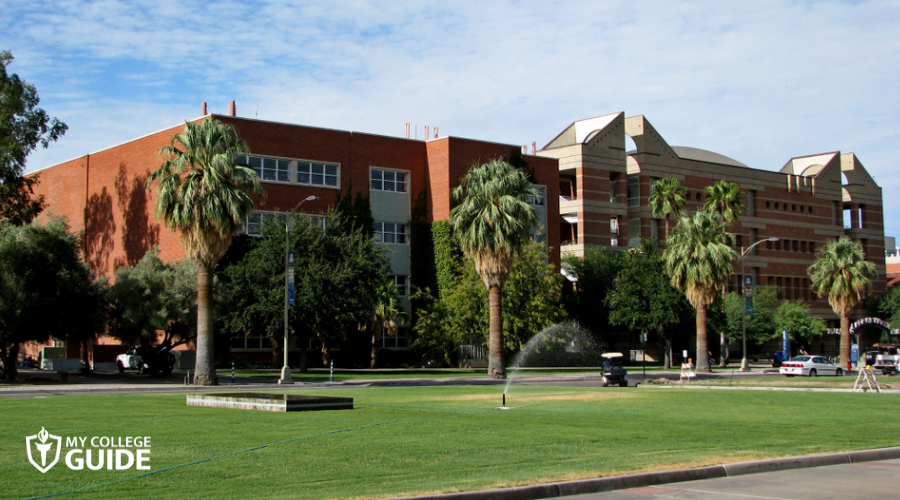
When doing your research into a prospective school, you may have noticed that many colleges are accredited by a variety of accrediting agencies.
A regionally accredited school is one that has gone through a voluntary review process of its educational programs in order to ensure that they meet high-quality standards. Credits from regionally accredited schools are more likely to transfer, and degrees from the school are more recognized by employers. Regional accreditation is also required for many forms of financial aid as well.
Editorial Listing ShortCode:
During your research into schools that offer theology degree programs, you can reference the U.S. Department of Education’s website. The U.S. Department of Education recognizes several regional accrediting agencies that evaluate schools across the United States.
Financial Aid and Scholarships

When thinking about college, you may worry about the cost. There are several ways to seek financial assistance for college, such as state and federal aid, scholarships, and federal work-study programs.
In order to apply for federal aid, you can submit a Free Application for Federal Student Aid (FAFSA) through the U.S. Department of Education. State aid is provided by your state government, which is a separate application process. If you demonstrate financial need, you may also qualify for a federal work-study program that allows you to work a part-time job to help pay for college.
Scholarships are monetary awards you can apply for, usually by submitting an application and any other materials requested by the organization offering it.
What Is a Theology Degree?

A theology degree is a program of study that involves the examination of religion and the interpretation of religious texts, figures, and historical events. Theology online schools typically offer specializations to focus on a specific sector within theology, such as biblical studies, ministry, or pastoral care.
The curriculum is typically designed to provide you with a deeper understanding of the Christian faith and other religions. This is often accomplished through the examination of religious literature and by approaching the evolution of the Church from a historical, sociological, and political perspective.
Online theology programs can help you build leadership skills to become confident in leading worship in a congregation or religious community.
Is an Online Degree in Theology Right for Me?

Theology is a specialized field that holds a wealth of knowledge for those who are interested in religion, spirituality, and providing support and guidance to others.
There are several common advantages to earning a theology degree online, including:
- Flexibility to schedule classes around missionary work or career obligations
- Numerous specializations within theology to further customize your degree
- Instruction from top religious experts through well-known Christian universities
- Lower tuition costs than on-campus degree programs at private institutions
Whether you wish to teach others through religious education or become a senior pastor at your church, there are a number of different theology degree options available through the flexibility of online learning.
What Can You Do with a Theology Degree?

The research, critical thinking, and analytical skills you may acquire throughout a theology program can prepare you for several careers.
According to the Bureau of Labor Statistics, the industry with the highest level of employment for clergy is religious organizations. Many students seek clergy positions, such as minister or pastor, upon receiving their degree. If you want to be a leader of a congregation and conduct worship, you may be interested in a clergy position.
Editorial Listing ShortCode:
Other careers aside from clergy positions that may be attainable include religious writer, fundraising officer, and Bible translator.
How Long Does It Take to Get a Theology Degree Online?

A traditional bachelor’s degree typically requires a minimum of 120 credit hours to complete. Most colleges and universities define full-time enrollment as taking at least 15 credit hours per semester.
If you enroll in a traditional, 16 week semester program and study full-time, it typically takes 4 years to complete a bachelor’s program. Some programs follow an 8 week semester schedule, which can be completed in less time with year-round enrollment. It can take longer than 4 years to complete a bachelor’s degree if you study part-time.
What’s the Difference between a Bachelor of Divinity Degree vs. Theology Degree?

A theology degree may be supplemented with a divinity specialization or offered as a separate program.
- A Bachelor of Divinity concentrates on the study of spirituality and all things considered divine while incorporating coursework in theology and religious studies.
- A Bachelor of Theology is broader as it encompasses the study of all religions, with special attention to historical, political, and sociological contexts of religious doctrines and the evolution of the Church.
A divinity degree is ideal for leadership positions in religious organizations, while a theology degree may allow you to explore a broader range of careers.
What’s the Difference between a Biblical Studies vs. Theology Major?
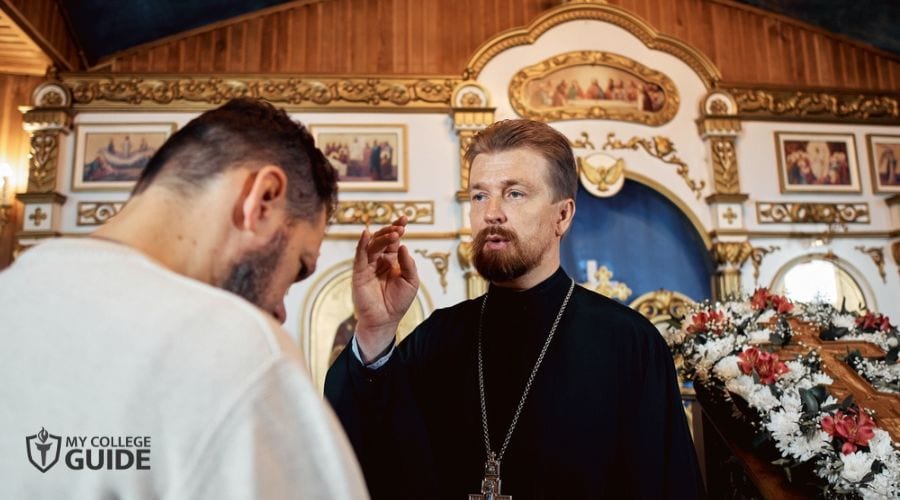
A biblical studies major incorporates theology coursework into the curriculum, but major coursework in a theology degree and a biblical studies degree differ.
- Biblical studies programs typically concentrate on the interpretation and analysis of the Bible, including an overview of each book and important biblical figures and historical events.
- Theology studies the bigger picture of religions and how they’ve evolved by analyzing scripture, religious traditions and beliefs, and the purposes of faith and higher powers.
Each major can be beneficial for various theology careers, but a biblical studies degree may be better suited for careers that involve communicating the Word of God.
Is a Bachelor’s in Theology Degree Worth It?
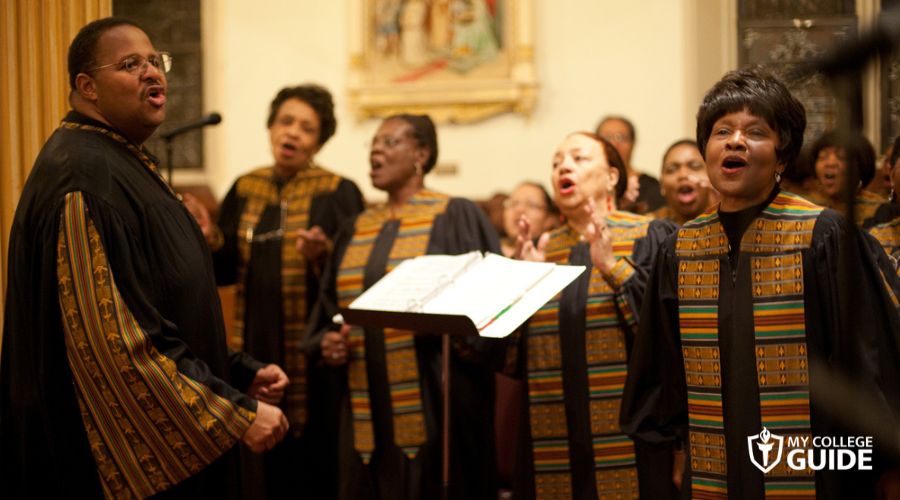
Yes, a bachelor’s in theology degree is worth it for many students. Earning this degree can help you gain a better understanding of faith and religion from different perspectives.
Editorial Listing ShortCode:
If you want to become a religious worker or Bible translator or pursue a graduate degree to become a theologian, this degree path may fit your career goals. According to the Bureau of Labor Statistics, most professionals in the theology degree field work in community and social service occupations, which have a faster than average job growth compared to all occupations.
Universities Offering Online Bachelor in Theology Degree Programs
Methodology: The following school list is in alphabetical order. To be included, a college or university must be regionally accredited and offer degree programs online or in a hybrid format.

Anderson University offers a Bachelor of Christian Studies. The program is entirely online and requires 22 credits. The curriculum offers electives to customize degrees to specific career goals. Courses are in an 8 week accelerated format with multiple start dates throughout the year.
Anderson University is accredited by the Southern Association of Colleges and Schools Commission on Colleges.

A BA in Bible and Theological University can be earned through Arizona Christian University. The fully online program provides an interpretation of the Bible through a modern lens. On average, the program can be completed in 4 years with the option to potentially earn a master’s as well in a total of 5 years.
Arizona Christian University is accredited by the Higher Learning Commission.

Biola University offers the opportunity to earn a BS in Bible, Theology, and Apologetics with a minor in Bible. All courses are entirely online. The program requires 120 credits and may accept credit for prior learning. Courses are 7 to 8 weeks long with multiple start dates throughout the year.
Biola is accredited by the WASC Senior College & University Commission.

Affordable Colleges named Brescia University among the best online schools in the nation for theology degrees. The school offers a BA in Theology with the option to add an emphasis in Pastoral Studies. The online program focuses on Catholic theology. Courses are offered in an accelerated format.
Brescia University is accredited by the Southern Association of Colleges and Schools Commission on Colleges.

A BS in Bible and Theology is available through Clarks Summit University. The program is entirely online and offers 50 elective credits to customize degrees to specific career goals. Potential courses include World Religions, Academic and Researched Writing, or Theology Survey.
Clarks Summit University is accredited by the Middle States Commission on Higher Education.

Concordia University – Wisconsin offers a BA in Theological Studies. The program is fully online and requires 128 credits. Concordia’s classes provide a Lutheran focus. Courses are offered in 8 week terms with multiple start dates throughout the year. Potential courses include Christ’s People Through the Ages and Heritage of Faith.
Concordia University – Wisconsin is accredited by the Higher Learning Commission.

DeSales University offers a BA in Theology. The program focuses on Catholic doctrine and can be completed online or through evening classes on campus. Courses are offered in 8 to 16 week sessions. Up to 75 of the required 120 credits may be transferred into the program.
DeSales University is accredited by the Middle States Commission on Higher Education.

A Bachelor’s in Theology is offered through the Franciscan University of Steubenville. The program focuses on the Catholic faith and is offered entirely online. Most courses are in an asynchronous format and follow a regular semester schedule.
The Franciscan University of Steubenville is accredited by Higher Learning Commission.

Gods Bible School & College offers the opportunity to earn a BA in Bible and Theology, which can be completed entirely online or on campus. The program requires 120 credits, including 18 electives. Courses follow a regular semester schedule, with start dates in the fall, spring, and summer.
Gods Bible School & College is accredited by the Higher Learning Commission.

Grace Christian University offers a BS in Leadership and Ministry through a fully online program. The program requires 120 credits and can typically be completed in 4 years. Courses are 5 weeks long. Potential courses include Life Communication, Issue in Christian Leadership, and Letters of Paul.
Grace Christian University is accredited by the Higher Learning Commission.

Grand Canyon University offers the opportunity to earn a BA in Christian Studies. The program offers several concentrations, including Biblical Studies, Global Ministry, and Youth Ministry. The program requires 120 credits and is fully online. Courses are in an asynchronous learning format and are accelerated. GCU offers weekly start dates.
GCU is accredited by the Higher Learning Commission.

A BA in Theology is offered through Holy Apostles College & Seminary. The program can be completed entirely online or on campus. The program requires 120 credits with the option to double major with a related degree. Courses follow a regular semester schedule.
Holy Apostles College & Seminary is accredited by the New England Commission on Higher Education.

Houston Christian University offers a BA in Theological Studies through a fully online program. The program requires 120 credits, including 32 hours of electives and a Biblical language like Greek or Hebrew. Courses are 8 weeks long with 2 terms offered each fall, spring, and summer semester.
Houston Christian University is accredited by the Southern Association of Colleges and Schools Commission on Colleges.

Lee University offers a BA or BS in Bible and Theology. Both programs are entirely online and require 120 credits. Courses are 7 weeks long. Potential courses include Doctrine of the Holy Spirit and Johannine Literature.
Lee University is accredited by the Southern Association of Colleges and Schools Commission on Colleges.

Liberty University offers a BS in Bible with a concentration in Theology. The program is fully online. Up to 75% of the 120 required courses may be transferred into the program. Courses are 8 weeks long, and there are multiple start dates throughout the year.
Liberty University is accredited by the Southern Association of Colleges and Schools Commission on Colleges.
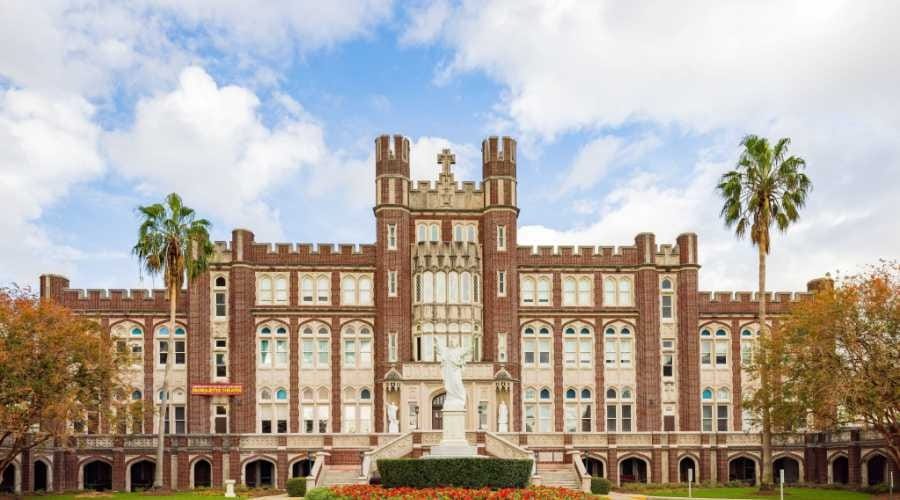
A BA in Ministry and Theology is available through Loyola University – New Orleans’s entirely online program. The program requires 120 credits. Applicants must have at least 2 years working in ministry. Courses are 8 weeks long, and there are several convenient start dates.
Loyola University New Orleans is accredited by the Southern Association of Colleges and Schools Commission on Colleges.

Moody Bible Institute offers a BS in Theological Studies through a fully online program. The program requires 120 credits. Courses are 8 weeks long, and there are 2 terms per semester. Potential courses include The Theological Task and Bibliology or Oral and Written Communication.
Moody Bible Institute is accredited by the Higher Learning Commission.

An online BA in Bible and Theology is offered through Multnomah University. The program requires 124 credits. Courses follow a semester schedule with start dates in the fall and spring. Potential courses include Bible Study Methods or Philosophy and Christian Thought.
Multnomah University is accredited by the Northwest Commission on Colleges and Universities.

Nazarene Bible College offers a BA in Ministry with a major in Bible and Theology. The program requires 120 credits. Courses are in an accelerated format, and there are many start dates throughout the year. Potential courses include New Testament Gospels, Spiritual Formation, and Global Evangelism.
Nazarene Bible College is accredited by the Higher Learning Commission.

A Bachelor’s in Biblical and Theological Studies is available through a fully online program at North Central University. The program requires 124 credits. Courses are 8 weeks long with multiple start dates each year. The program aims to prepare students for graduate work and ministry credentials.
North Central University is accredited by the Higher Learning Commission.

Regent University offers the opportunity to earn a BA in Biblical and Theological Studies. The program can be completed online or on campus. Courses are 8 to 15 weeks long. Up to 90 of the required 120 credits may be transferred into the program. Potential courses include Old Testament Historical Books and Systematic Theology.
Regent University is accredited by the Southern Association of Colleges and Schools Commission on Colleges.

A BA in Theological Studies is available through Saint Joseph’s College of Maine. The program is fully online and requires 120 credits. Courses are taught with a focus on the Roman Catholic faith. The program is in an accelerated format with 5 start dates each year.
Saint Joseph’s College of Maine is accredited by the New England Commission on Higher Education.

Southwestern Assemblies of God University offers a BA in Bible and Theology entirely online. The program offers an optional specialization in Pre-Ministry. An exam on campus is required for those seeking ministry credentials. Courses are 7 weeks long and are offered twice each semester.
Southwestern Assemblies of God University is accredited by the Southern Association of Colleges and Schools Commission on Colleges.

Truett McConnell University offers a fully online BA in Christian Studies with a concentration in Biblical and Theological Studies. The program requires 125 to 127 credits. Courses are offered in accelerated half-terms with several start dates each year.
Truett McConnell University is accredited by the Southern Association of Colleges and Schools Commission on Colleges.

The University of the Cumberlands offers a Bachelor’s in Ministry and Missions. The program is entirely online. The curriculum consists of 120 credits with 12 credits as elective courses. Courses are offered in bi-terms, and there are multiple start dates throughout the year.
The University of the Cumberlands is accredited by the Southern Association of Colleges and Schools Commission on Colleges.
Getting Your Bachelor’s Degree in Theology Online

An online theology degree can help you develop a better understanding of religion and how it has impacted society throughout history. It can also be useful for exploring your own religious beliefs and relationship with God through the study of faith and scriptures.
If you want to pursue a clergy position, online seminary degrees can be beneficial in developing the leadership, communication, and analytical skills essential to interpreting the Bible and leading worship.
You can take the first steps toward earning your theology degree by exploring accredited colleges and universities and online theology programs that support your interests and goals.
